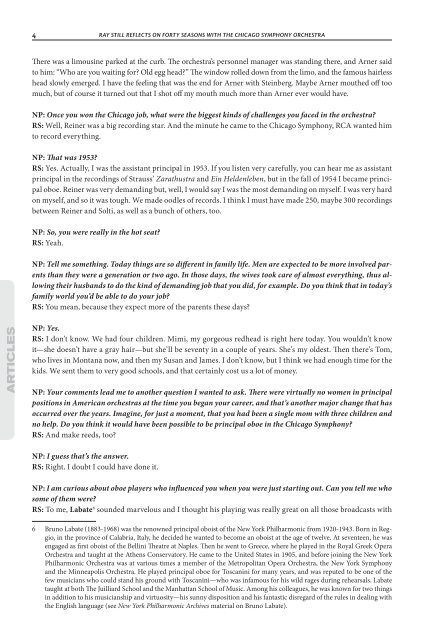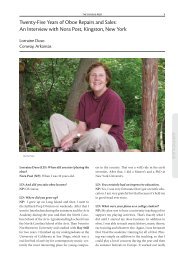Ray Still - Nora Post Inc.
Ray Still - Nora Post Inc.
Ray Still - Nora Post Inc.
Create successful ePaper yourself
Turn your PDF publications into a flip-book with our unique Google optimized e-Paper software.
ARTICLES<br />
4<br />
RAY STILL REFLECTS ON FORTY SEASONS WITH THE CHICAGO SYMPHONY ORCHESTRA<br />
There was a limousine parked at the curb. The orchestra’s personnel manager was standing there, and Arner said<br />
to him: “Who are you waiting for? Old egg head?” The window rolled down from the limo, and the famous hairless<br />
head slowly emerged. I have the feeling that was the end for Arner with Steinberg. Maybe Arner mouthed off too<br />
much, but of course it turned out that I shot off my mouth much more than Arner ever would have.<br />
NP: Once you won the Chicago job, what were the biggest kinds of challenges you faced in the orchestra?<br />
RS: Well, Reiner was a big recording star. And the minute he came to the Chicago Symphony, RCA wanted him<br />
to record everything.<br />
NP: That was 1953?<br />
RS: Yes. Actually, I was the assistant principal in 1953. If you listen very carefully, you can hear me as assistant<br />
principal in the recordings of Strauss’ Zarathustra and Ein Heldenleben, but in the fall of 1954 I became principal<br />
oboe. Reiner was very demanding but, well, I would say I was the most demanding on myself. I was very hard<br />
on myself, and so it was tough. We made oodles of records. I think I must have made 250, maybe 300 recordings<br />
between Reiner and Solti, as well as a bunch of others, too.<br />
NP: So, you were really in the hot seat?<br />
RS: Yeah.<br />
NP: Tell me something. Today things are so different in family life. Men are expected to be more involved parents<br />
than they were a generation or two ago. In those days, the wives took care of almost everything, thus allowing<br />
their husbands to do the kind of demanding job that you did, for example. Do you think that in today’s<br />
family world you’d be able to do your job?<br />
RS: You mean, because they expect more of the parents these days?<br />
NP: Yes.<br />
RS: I don’t know. We had four children. Mimi, my gorgeous redhead is right here today. You wouldn’t know<br />
it—she doesn’t have a gray hair—but she’ll be seventy in a couple of years. She’s my oldest. Then there’s Tom,<br />
who lives in Montana now, and then my Susan and James. I don’t know, but I think we had enough time for the<br />
kids. We sent them to very good schools, and that certainly cost us a lot of money.<br />
NP: Your comments lead me to another question I wanted to ask. There were virtually no women in principal<br />
positions in American orchestras at the time you began your career, and that’s another major change that has<br />
occurred over the years. Imagine, for just a moment, that you had been a single mom with three children and<br />
no help. Do you think it would have been possible to be principal oboe in the Chicago Symphony?<br />
RS: And make reeds, too?<br />
NP: I guess that’s the answer.<br />
RS: Right. I doubt I could have done it.<br />
NP: I am curious about oboe players who influenced you when you were just starting out. Can you tell me who<br />
some of them were?<br />
RS: To me, Labate 6 sounded marvelous and I thought his playing was really great on all those broadcasts with<br />
6 Bruno Labate (1883-1968) was the renowned principal oboist of the New York Philharmonic from 1920-1943. Born in Reggio,<br />
in the province of Calabria, Italy, he decided he wanted to become an oboist at the age of twelve. At seventeen, he was<br />
engaged as first oboist of the Bellini Theatre at Naples. Then he went to Greece, where he played in the Royal Greek Opera<br />
Orchestra and taught at the Athens Conservatory. He came to the United States in 1905, and before joining the New York<br />
Philharmonic Orchestra was at various times a member of the Metropolitan Opera Orchestra, the New York Symphony<br />
and the Minneapolis Orchestra. He played principal oboe for Toscanini for many years, and was reputed to be one of the<br />
few musicians who could stand his ground with Toscanini—who was infamous for his wild rages during rehearsals. Labate<br />
taught at both The Juilliard School and the Manhattan School of Music. Among his colleagues, he was known for two things<br />
in addition to his musicianship and virtuosity—his sunny disposition and his fantastic disregard of the rules in dealing with<br />
the English language (see New York Philharmonic Archives material on Bruno Labate).



